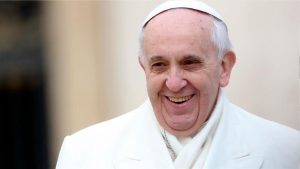
By Deirdre Powell - 13 May, 2018

Pope Francis
This year’s World Communications Day (WCD) will be celebrated on 13 May, which is the Sunday before Pentecost. In some parts of the world, however, WCD is marked as the solemnity of the Ascension.
This year’s theme is “‘The truth will set you free’ (Jn 8:32). Fake news and journalism for peace”, and the celebration on 13 May constitutes the 52nd anniversary of the inauguration of WCD.
In his message, Pope Francis notes that “communication is part of God’s plan for us and an essential way to experience fellowship”. He notes the spread of “fake news” and returns to the issue of truth, a theme that was previously raised by his predecessors. In his message, the Pope seeks to contribute to stemming the spread of fake news and to rediscovering the dignity of journalism, as well as the personal responsibility of journalists to communicate the truth.
The Pope defines fake news as the spreading of disinformation in the traditional media or online, noting its ability to seem plausible and to mimic real news. He points out that the difficulty of unmasking and eliminating fake news arises because “many people interact in homogeneous digital environments impervious to differing perspectives and opinions”.
Pope Francis observes that a profound and careful process of discernment is needed in order to prevent disinformation and identify the way it works. He notes that fake news often goes viral because it appeals to human beings’ insatiable greed. The Pope cites the importance of teaching people how to discern, evaluate and understand our deepest desires and inclinations in order to educate for truth. Pope Francis points out that the most radical antidote to the virus of falsehood is purification by truth and notes the importance of freedom from falsehood and the search for relationship.
The Pope identifies journalists as protectors of news. He concludes by inviting everyone to promote a journalism of peace, by which he means “a journalism that is truthful and opposed to falsehoods, rhetorical slogans and sensational headlines”.
The WCD constitutes the only worldwide celebration called for by the Second Vatican Council and was first introduced by Blessed Pope Paul VI in 1967 in response to the first signs of enormous change in the field of social communication. Successive popes have provided themes for WCD, and these themes reflect the changes and rapid development that have been witnessed in the field of communications over the last five decades or so.
In this era, the Church seeks to be present in the world of communications, in order to highlight the values it sees as suitable for people’s development and their eternal welfare. The challenge is to ensure that Christ’s message continues to be communicated in a rapidly developing media age, which is a challenge that is ever present.